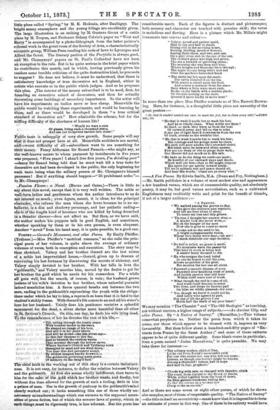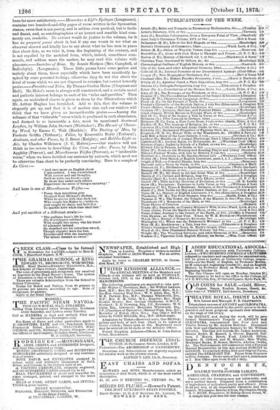Porrar.— Gerard's Monument, and other Poems. By Emily Pfeiffer. (Triilmer.)—Miss
Pfeiffer's "metrical romance," as she calls the prin- cipal poem of her volume, is _quite above the average of ordinary volumes of'verse, both in conception and execution. The story may be Cans sketched. Valery and her brother Gerard are the. last scions of a, noble but impoverished house,—Gerard, given up to dreams of recovering his lost fortunes by discovering the secrets of alchemy, and Valery simply devoted to her brother. With her falls in love the "-goldsmith," and Valery marries him, moved by the desire to get for her brother the gold which he needs for his researches. For a while all goes well, but the search, of course, ii vain; the husband grows jealous of his wife's devotion to her brother, whose unlawful'pursuits indeed scandalise him. A fierce quarrel breaks out between the two men, ending in the goldemith'S reproaching the youth with the obliga- tions under which he lay to him, a reproach so keen that it is-fatal to the student's sickly frame. With Gerard's life eomes to an end all his sister's loyc for her husband. Vainly does his penitence contrive a splendid rtrnpineset,lcir the dead, a silver shrine more beautiful than all other in St. Saviour's Church. On this, one day, ho finds his wife lying dead. 'to the remembrance of her he devotes the rest of his life,- " Tin, toiling through the lonely years
LiDifisv Li With towhee tender as his tears,
xdi,„ Hetpelsg Image of his above. lrr� 133,68 till I In And kill he works—the tisk-wives say-
, At that fair likeness to this day.
80iVt'll 'gal al '1,:" And so beneath, the restless waves
eth asswnrf wT14183.tri:uSrAuOrtlikregYhe2eatil'igde:svlee;t0W11
]Ip?il ninsli 1V Otrangled by mod tuld sea Went down, • You hear that dull persistent sound, bewo d Is vy,su Its wildest tempest hardly drewn'd,— "P°112 aintrotterfatardt,.°T.grace ef fanit in the working out of this story is a certain indistinct- ness. It is not easy, for instance,_ to define the relation between Valery and the goldsmith. -Ki-first she seems Whiillimdifferent, then turns to him for the sake of Wij?4,1 vihIchlter biubI e w is and finally, but -without due time allowed for the growth of such a feeling, finds in him arprince of men. Nor is the growth of jealousy in the goldamith's mind dearly worked out; it looks something like one of those wholly un ruidessary misunderstandings which one excuses to the supposed neces- sities of prose fiction, but of whioh the severer laws of poetry, which in spill:hinge must be rigorously true, is less tolerant. But the poem has-
considerable merit. Each of the figures is distinct and picturesque; both scenery and character are touched with genuine skill; the verse is melodious and flowing. Here is a picture which Mr. Millais might transmute into canvas and colour
Valery, proud and patient maid, Half in son and half in shade, Sitting still in the morning hours, Sorting, binding, meadow !lowers; Laying them three, and two, and one, On a grey stone slab in the eye of the sun. The orchard grass was high and green, The sea a breadth of quivering sheen; The morning sky was deep and blue, Where boughs and blossoms let it through; The apple blooms hung white and red Over the raaiden's burnished head.
" The shells lay hot upon the sand ; The cattle slumber'd on the lea, With scarce a sound upon the land,
And scarce a murmur from the sea— Save where a little wave more rash,
Broke on the beach with a sudden plash; Or titterels nesting on the mere,
Quarrel'd more loudly or more near."
In more than one place Miss Pfeiffer reminds us of Mrs. Barrett Brown- ing. Here, for instance, is a thoughtful little piece not unworthy of the great poetess:-
" Ile that is washed needeth not save to wash his feet, but is clean every whit."—JOHN sill , 10.
"He that is wash'd needs but to wash his feet, And he is wholly clean. What words are these ?
So hard, so dark, they warn us from the beat Of outward sense, and bid us rise to seize Some ray of light flaslid downwards from the sun Of truth, eternal as the truthful One.
"He that is waeh'd needs but to wash his feet; His comings and his goings must be clean, His path still pure adown life's crowded street, His track upon its mire and slime unseen.
Few are too weak or vile to purge their walk ; Our Master did not mock us In His talk.
He bade us do the thing we could—no more ;
Be heedful of our outward ways and deeds. Watch well our feet—that so He might outpour His spirit for our spirits' inward needs : Till we in sabbath rest and peace should sit, And hear His words, Olean are ye every whit."
--A Few Poems. By Edwin Smith, M.A. (Dunn and Fry, Nottingham.) —Mr. Smith publishes in a volume of most modest size and appearance a few hundred verses, which are of commendable quality, not absolutely poetry, it may be, but good verses nevertheless, such as a cultivated Englishman may creditably write and print for the benefit of friends, if not of a larger audience :—
"A PARTING.
"We walked among the graves to-day, She gave the sentence past reprieve, And left me here alone to stray,
To count my loss and icily grieve. "'Tie tree I thought her answer wise, — A kinder look she never wore,— But oh the hunger of my eyes Now she is gone to come no more "To come not as she used to be, A bright companionable vision, Whose 'very faults were dear,—ah me ! I mach miedoubt our sage decision.
"No bell is tolled, no grave is made, No mourners warn the passer-by That here in Booth is being laid A tender fancy doomed to die.
"He who resigns the fond belief
In one he hoped to call his own, Allows no partner of his grief, But mourns the lost one all alone. "Farewell romantic dreams of yore, Farewell dear headlong trust of youth, And foolish passion that still bore Within itself some soul of truth.
"What though the end is come of all, And truth itself decrees to sever Two lives, and drops its funeral pall On bliss we wildly planned—for ever : " Yes, though we knew it could not be, And lately wise agreed to pert, Not one of all the graves I see Holds half the death of my poor heart."
We may mention "The Chemist " and "The Old Geologist " as touching, net without success, a higher range of subjects.—An Ancient City, and other Poems; By "A Native of Surrey." (Macmillan.)—This volume somewhat perplexes us. - Neither the poem from which it takes its name; nor those Which appear to be classed with its impress us very favourably: But then follow about a .hundred-and-fifty pages of "Ex- tracts from Poems by the Same Author ;" and some of these extracts appear to be of quite different quality. Some blank-verse in particular, from a_poem named "Judas. Maccabnus," is quite passable. We may take. these for instance :- "Thy solitary mother, child.of Dan, Looks out from Zorab's memorable rock For one who comes not, one who will not come; Listens, as though one footfall might be known Among a thousand: listens, half id hope And half in fear, prophetic."
"Clouds big with IRK or charged with thunder, climb The coast, from Carmel to the Brook of Reeds, While, rolled together from the land of davin, OR Ebal gathers blackness veiling tire; As tho' the curses on a broken law
Olsog to the mountain."
And so there are some seven or eight other poems, of which he shows also samples, most of them of respectable quality. "The Native of Surrey" —the title is itself an eccentricity—must know that it is impossible to form an estimate of poems in this way. One of them in its entirety would have,
Or this.
been far more satisfactory.—Memories: a Life's Epilogue (Longmans), contains two hundred-and-fifty pages of verse written in the Spenserian stanza, verso that is not poetry, and is seldom even poetical, but is facile and fluent, and, as autobiographies of an honest and sensible kind com- monly are, readable. No extract would do justice to the volume, for it has no purpurei panni about it, but if any one wants to see what an observer shrewd and kindly has to say about what he has seen in years that about date, as wo take it, from the beginning of tho century, and is not repelled by the metrical form, which, indeed, sometimes com- mends, and seldom mars the matter, he may read this volume with pleasure.—Snatches of Song. By Jeanie Morison (Mrs. Campbell, of Ballochyle). (Longmans). These little poems have some pathos and melody about them, those especially which have been manifestly in- spired by some personal feeling ; otherwise they do not rise above the level of verse which we are not disposed to censure, but cannot honestly praise.—Parables and Tales. By Thomas Gordon Hake. (Chapman and Hall). Mr. Hake's verse is always well constructed, and a certain moral and pathetic interest belongs to each of his "tales and parables." Then again, an undoubted charm is given to them by the illistrations which Mr. Arthur Hughes has furnished. Add to this, that the volume is elegantly got up, and that it is of modest size, and our readers will think that we have given no inconsiderable praise.—Among the volumes of that " tolerable " verse which is produced in such abundance, and doomed to so inexorable a fate, must be mentioned Scattered Leaflets, by William John Stewart (Whittaker); The Hermit of Chever- ley Wood, by Emma C. Wait (Rankin); The Destiny of Man, by Frederic Griffin (Triibner); Felice, by Esmeralda Boyle (Triibner); Atalanta, and other Poems, by J. Brent (Knight); and Bubbles Light as Air, by Charles Wilkinson (J. C. Hotten).—Our readers will not think DA too severe in describing Le Circe, and other Poems, by John Appleby (Provost), and Miscellaneous Trifles (Provost), as " intolerable verse," when we have fortified our sentence by extracts, which need not be otherwise than short to be perfectly convincing. Here is a sample of Le Circe :—
" And once more on English shore I safe arrived. I was o'erwhelmed With sorrow and sad thoughts, Such as none can know,—only By those that under such affairs Experience the sense of being a castaway: "
And here is one of Miscellaneous Trifles :— "Poesy, thou matchless gem
Dropped from Michael's diadem When he strove with that dark foe Who sought his Maker to o'erthrow, And caught by chaos, and held fast To sparkle here while time shall last."
And yet another of a different strain :— " The guiltless Inca's life he took, His Worshippers subdued ; With naught like mercy was his heart
Of adamant imbued.
He sheathed not his relentless sword, Though slippery were his feet, Encrimeoned with the massacre The tyrant deemed so sweet."



































 Previous page
Previous page